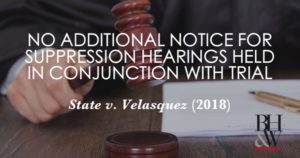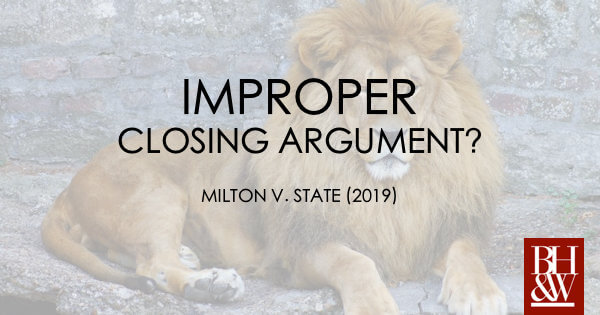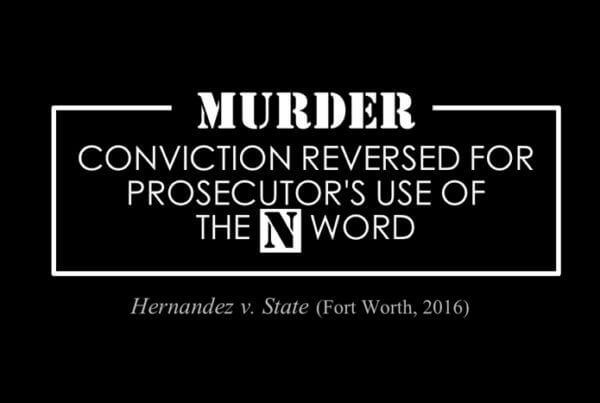Texas Court of Criminal Appeals Determines That There Needs to be No Additional Notice Provided to the State When Holding a Suppression Hearing On the Day of a Trial
 The Court of Criminal Appeals recently handed down a decision affirming a trial court judge’s decision to hold a suppression hearing on the day the trial was set, but before voir dire or any trial proceedings occurred. State v. Velasquez, 2018 Tex. Crim. App. LEXIS 52. After a prior motion for continuance by the State was granted, the defense submitted 16 pretrial motions, including a motion to suppress evidence. On the day of the trial, both sides announced ready, and the judge chose to hold the suppression hearing before jury selection. The State objected because they were not provided with proper notice of the hearing (and because their witnesses were not present to testify for the motions hearing before jury selection), but the objection was overruled and the judge ruled in favor of the defendant. The Fourth Court of Appeals reversed the trial judge’s decision, but that was overturned by the Court of Criminal Appeals, affirming the trial court ruling on the motion.
The Court of Criminal Appeals recently handed down a decision affirming a trial court judge’s decision to hold a suppression hearing on the day the trial was set, but before voir dire or any trial proceedings occurred. State v. Velasquez, 2018 Tex. Crim. App. LEXIS 52. After a prior motion for continuance by the State was granted, the defense submitted 16 pretrial motions, including a motion to suppress evidence. On the day of the trial, both sides announced ready, and the judge chose to hold the suppression hearing before jury selection. The State objected because they were not provided with proper notice of the hearing (and because their witnesses were not present to testify for the motions hearing before jury selection), but the objection was overruled and the judge ruled in favor of the defendant. The Fourth Court of Appeals reversed the trial judge’s decision, but that was overturned by the Court of Criminal Appeals, affirming the trial court ruling on the motion.
Texas Code of Criminal Procedure Article 28.01
The State based its appeal on Article 28.01 of the Texas Code of Criminal Procedure. This statute enables the judge to schedule pretrial hearings (Section 1), requires notice of these hearings to be provided to the defense (Section 2), and gives the required means of providing notice (Section 3). The State claimed that it was not provided adequate notice of the pretrial suppression hearing under this statute, and therefore, should have been given an opportunity to delay the hearing and trial.
Section 1
Article 28.01(1) allows for the court to set a pretrial hearing before it is set for a trial upon the merits. The Court of Criminal Appeals recognized that this creates two separate settings and that the court must provide adequate notice for any new and separate hearing. Included in this list of settings is a suppression hearing in Section 1(6). The court also acknowledges that many suppression hearings are done as a part of trial, and that parties should be capable of arguing for or against suppression at the time of the trial. In this case, the State was not prepared for the suppression hearing and refused to argue, forcing the court to rule in favor of the defendant.
Section 2
Article 28.01(2) requires the court to provide notice of at least 10 days to the defendant in order to allow the defendant enough time to respond and raise any additional preliminary matters. The State argues that it is entitled to notice, however, the Court points out that the statute only provides for notice given to the defendant. The Court decided that the State has no right to additional notice for a pretrial motion that will be handled on the day of the trial, so long as notice of the trial day setting was given to the State.
Section 3
Article 28.01(3) establishes the acceptable methods for providing notice to the defendant. Notice can be given through an announcement in open court in front of the defendant and his/her attorney, personal service to defendant, or by mail.
Court of Criminal Appeals’ Conclusion
Ultimately, the CCA held that it was appropriate for the trial court to hold a suppression hearing on the same day as trial, despite not giving additional notice to the State. The notice of the trial setting was sufficient to make the State aware of the possibility of a suppression hearing, and the State should have been ready for that hearing. The court sees a distinction between a pretrial setting and handling a matter just before the trial begins. Because suppression hearings are often held in conjunction with trials, this action was proper. Article 28.01 does not apply in this instance because there was no new, separate setting, and the party complaining about notice was the State. The Court understands that there could be improvements to the notice requirements, but as a member of the judicial branch, they are not empowered to make those changes.










